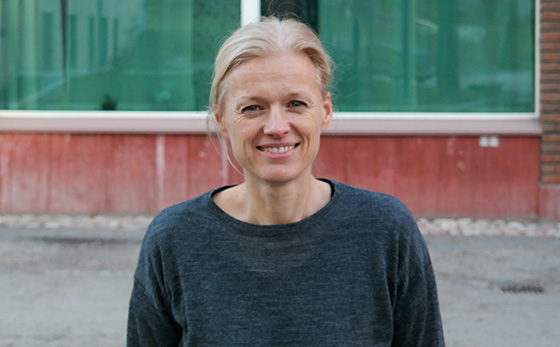Meet Karin Edvardsson Björnberg, the ABE School’s new deputy head of school

The ABE School’s first deputy head of school is new in her position – she got the title yesterday – but she has a long experience from KTH. She came here already 20 years ago, as a doctoral student in philosophy. For the last four years she has been the deputy director of third-cycle education at the ABE School and in her new role she looks forward to continued good collaboration with the school’s heads of departments.
So, what is the difference between being the first and second deputy head of school?
“The first deputy head of school replaces the head of school when he isn’t in place, that is the practical difference. Then we have different areas of responsibility, a large part of my work will be dedicated to the assignment as head of faculty renewal, what is often referred to as FFA. That includes producing a new plan for faculty renewal and faculty development, which I will do in collaboration with the heads of departments. As the FFA I will also be working strategically with the recruitment of staff, promotions and competence development.”
Why did you want to become deputy head of school?
“It was nothing I had planned or even considered but Björn Berggren asked and it seemed interesting. Partly because it will be a challenge and partly because I will get to work with people from different disciplines and learn more about KTH, the school and management questions.”
What is your background?
“My first encounter with academia was two years of philosophy studies in Gothenburg before I acquired a ”proper” education at the law programme in Uppsala. After that, I found my way back to philosophy which resulted in a dissertation on Rational goal-setting in environmental policy. In addition to teaching and research, I have had two recent commissions that have been very rewarding that I think I will benefit from in my new position. I have been the deputy director of third-cycle education and I have also been on a 25% leave of absence to serve as scientific secretary of one of the departments of the Swedish Ethical Review Authority”
What happens with those commissions now?
“I will hand over the assignment as deputy director of third-cycle education to someone else. It is a rewarding commission that I really can recommend. The directors of third-cycle education are responsible for quality development and we have been working with integrating gender equality and sustainable development among other things, and we have also revised the general study syllabuses that guide the third-cycle subject areas.”
“I would like to continue serving at the Swedish Ethical Review Authority – I am passionate about research ethics, integrity and ethical review issues, where ethics and law intersect – but the school comes in the first place and I think it will be difficult to have time for both. The commission as deputy head of school is 50% and I would like to have time for some research and supervision of doctoral students as well.”
Do you have any other thoughts about your new assignment?
“I look forward to working with a broader perspective. When you work at one of the divisions you tend not to think about what is happening at the school. But in a management role, you are forced to raise your gaze and think about what is expected from ABE, that is which societal needs we should accommodate and what society’s challenges look like. It will be interesting the follow the recruitment of staff, to learn more about subjects and departments and to work with the school’s heads of departments. I also see great possibilities in working with Björn Berggren and David Nilsson.”
“Now I will do this for four years and see what happens. It is important that people with different interests, experiences and perspectives contribute to the school management, you need a combination of competences. I hope to be able to contribute with mine during the coming four-year period.”
